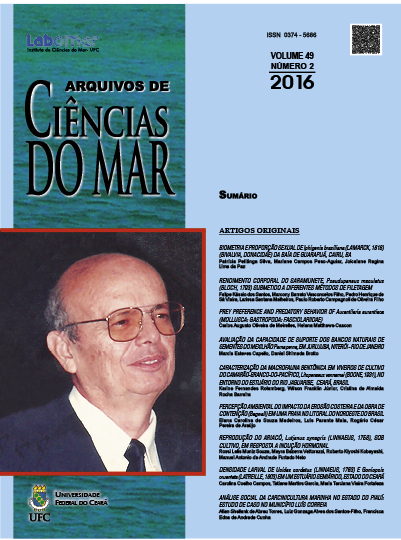Assessment of the carrying capacity of natural seed beds of the mussel Perna perna, at Jurujuba, Niterói, Rio de Janeiro State
DOI:
https://doi.org/10.32360/acmar.v49i2.6556Keywords:
carrying capacity, natural beds, Sustainability, mussel farming.Abstract
This study analyzed the natural seed beds support capacity utilized by the mussel farmers in the Jurujuba in Niterói county, together with the IBAMA’s Normative Instruction 105, 20 of July, 2006 which establishes – among others rulings – that harvest of a maximum of 50% from the total of seeds on the natural beds. To that purpose, the total area of the natural seed beds and the medium weight of the seeds found per square meter were calculated. The results indicate the total weight of the seeds found in the natural banks of the region as 1.148.560 Kg. However, the mussel farmers can only utilize up to 50% of this total, leaving at their disposal 574.280 Kg of seeds. A total of 20.853 ropes were found on the Jururuba’s longlines. With the knowledge that approximately 3Kg of seeds is distributed along every 1.5m of rope, a total of 60.949,56 Kg of seeds would be necessary to seed every existent rope. However, the importance of new studies is emphasized, since this topic has not yet been exhaustively evaluated, since there are many variables involved in assessing the support capacity of a mussel farm.
Downloads
Downloads
Published
How to Cite
Issue
Section
License
1. Proposta de Política para Periódicos de Acesso Livre
Autores que publicam nesta revista concordam com os seguintes termos:
- Autores mantém os direitos autorais e concedem à revista o direito de primeira publicação, com o trabalho simultaneamente licenciado sob a Licença Creative Commons Attribution que permite o compartilhamento do trabalho com reconhecimento da autoria e publicação inicial nesta revista.
- Autores têm autorização para assumir contratos adicionais separadamente, para distribuição não-exclusiva da versão do trabalho publicada nesta revista (ex.: publicar em repositório institucional ou como capítulo de livro), com reconhecimento de autoria e publicação inicial nesta revista.
- Autores têm permissão e são estimulados a publicar e distribuir seu trabalho online (ex.: em repositórios institucionais ou na sua página pessoal) a qualquer ponto antes ou durante o processo editorial, já que isso pode gerar alterações produtivas, bem como aumentar o impacto e a citação do trabalho publicado (Veja O Efeito do Acesso Livre).

